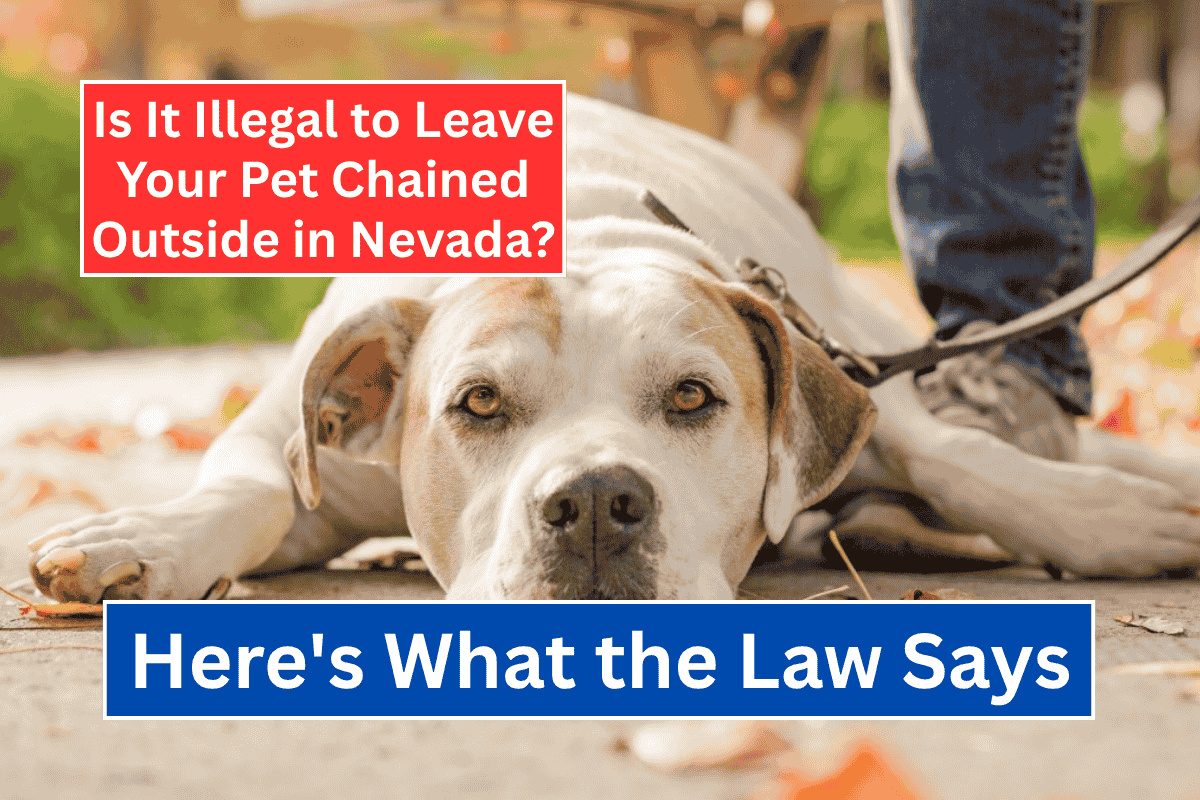Leaving a pet chained outside in Nevada is illegal in certain situations, as animal cruelty laws are in place to protect animals from neglect and mistreatment.
The law does not allow the unnecessary suffering of animals, which includes improper confinement or exposure to harsh conditions.
If you’re wondering whether it’s against the law to leave your pet tied up outside, here’s an overview of what the laws say and the potential consequences of violating them.
Nevada Animal Cruelty Laws
In Nevada, animal cruelty is taken seriously under Nevada Revised Statute § 574.100. This statute makes it a crime to engage in animal cruelty, including neglecting animals by leaving them chained outside for too long. The penalties for animal cruelty vary, but they can include jail time, fines, and community service.
The law specifically makes it a crime to unjustifiably hurt or kill animals, deprive them of food, water, or shelter, and to leave them outside in extreme weather conditions. Any action that causes unnecessary suffering to an animal could lead to criminal charges.
Restraining Dogs Outside in Nevada
Nevada has strict regulations regarding the way pets, especially dogs, are restrained outside. Tethering or chaining a dog for more than 10 hours within a 24-hour period is illegal.
Additionally, it is against the law to tether a dog in conditions that might cause harm, such as using improper restraints or chaining them in areas where they could become tangled or injured.
If the weather becomes dangerously hot—such as when the National Weather Service issues a heat advisory—the law also prohibits leaving dogs chained outside at all.
If temperatures reach 105 degrees Fahrenheit or more, pet owners must use cooling systems, like misting or portable air conditioners, to protect their pets.
Other Related Laws in Nevada
Aside from chaining restrictions, Nevada law covers a range of animal cruelty offenses. These include:
- Torturing or Maiming Animals: It is illegal to intentionally harm or kill animals without just cause. This can result in felony charges.
- Animal Fights: Participating in or organizing animal fights, such as dog fights or cockfights, is a crime in Nevada. This can lead to prison time and hefty fines.
- Animal Poisoning: Poisoning animals is also illegal, with penalties varying based on the type of animal harmed.
- Animal Neglect: Leaving animals without proper shelter, food, or water is considered neglect under Nevada law, and violators can face serious consequences.
Penalties for Violating Animal Cruelty Laws
The penalties for violating animal cruelty laws in Nevada depend on the offense and whether it’s a first-time or repeat offense. The law takes into account the severity of the animal’s suffering and may impose the following penalties:
- First offense: Misdemeanor, punishable by up to 6 months in jail, up to $1,000 in fines, and community service.
- Second offense: Misdemeanor, with harsher penalties including more jail time, higher fines, and more community service hours.
- Third or subsequent offenses: Felony charges, with a possible prison sentence ranging from 1 to 5 years, and fines up to $10,000.
In addition to these penalties, offenders may be required to pay restitution for the cost of caring for the animal, including veterinary bills, food, and shelter costs.
Reporting Animal Abuse in Nevada
If you witness animal abuse or believe an animal is being mistreated, it’s essential to report it. In Nevada, you can contact local animal control agencies to file a report. Below are some of the key numbers:
- Clark County: 702-455-7710
- Las Vegas Valley: 702-229-6444
- Henderson: 702-267-4970
- Washoe County: 775-322-3647
- Other Areas: Call 311 for information
When reporting, provide as much information as possible, including the location of the abuse, the owner of the animal, any photographic or video evidence, and a description of the abuse.
Nevada takes animal welfare seriously, and leaving your pet chained outside in certain conditions can be considered animal cruelty. It is important to follow the state’s laws and regulations to ensure the safety and well-being of your pet.
If you’re unsure about the rules, it’s always better to seek guidance to avoid penalties. By treating animals with kindness and respect, pet owners can contribute to a more humane society.












